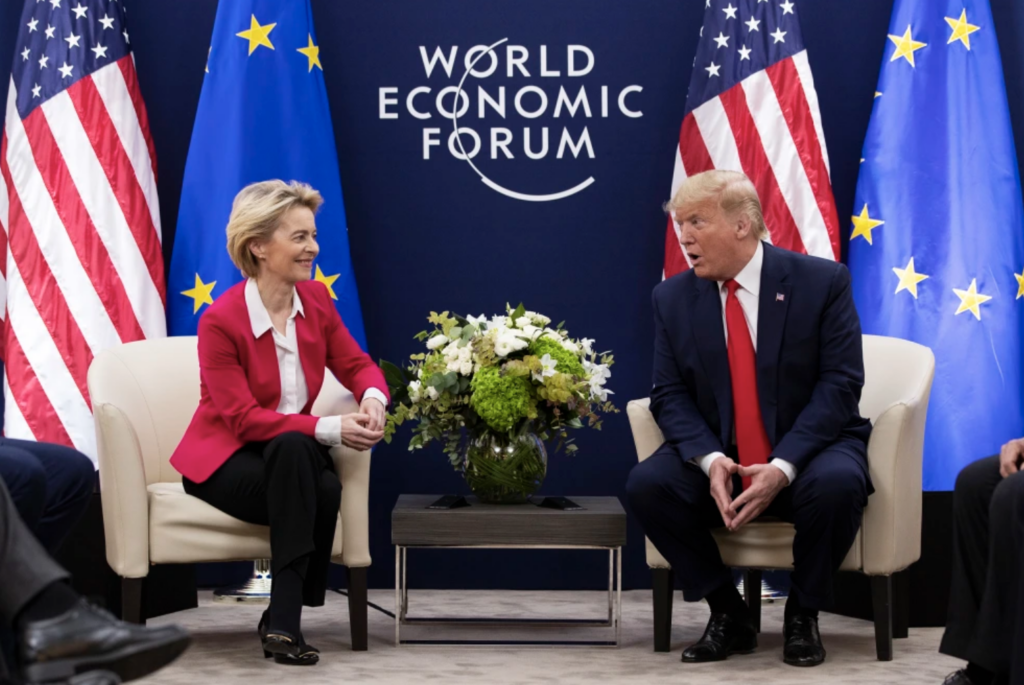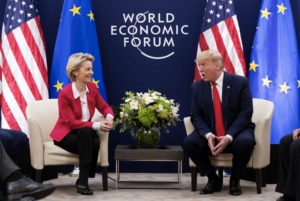The Second Trump Presidency Could Deepen the Rift Between US-EU Tech Cooperation
The incoming Donald Trump Administration has the potential to shake up the already tense tech space between the EU and US. Trump’s strong connections to Elon Musk call into question how the EU will manage its ongoing investigation into social media platform X’s operations.

President Donald Trump meets with European Commission President Ursula von Der Leyen at the World Economic Forum in Davos, Switzerland, in January 2020.Evan Vucci / AP file (via NBC)
The United States and the European Union (EU) are “bound by a true partnership between our people, uniting 800 million citizens. Let us work together on a transatlantic partnership that continues to deliver for our citizens.” This is the statement of EU Commission President Ursula von der Leyen following Donald Trump’s victory in the 2024 US presidential election. Despite von der Leyen’s welcoming words, the US election results hang above the heads of leaders across the EU. Although the US and the EU have long been partners across economic sectors, there are growing tensions about tech regulation, particularly with the implementation of the Digital Services Act. Trump’s strong ties to the tech industry and its leaders, such as Elon Musk, can potentially stifle the EU’s efforts at limiting Big Tech.
The Digital Services Act (DSA)
In recent years, the EU has sought to position itself as a global leader in technology regulation. From the passage of wide-sweeping regulations, such as the EU Artificial Intelligence (AI) Act — the first comprehensive AI legislation in the world — to tackling the question of tech monopolies, the tech regulatory space relies more and more on EU leadership. In February 2024, the Digital Services Act came into effect, causing a headache for a myriad of US-based tech companies. Aimed at protecting the fundamental digital and privacy rights of consumers, the DSA has lofty goals of creating “greater democratic control and oversight over systemic platforms” and “mitigation of systemic risks, such as manipulation or disinformation.”
The main category of providers to whom these concerns apply are “very large online platforms,” which consists of platforms or search engines that have more than 45 million monthly users. . Major U.S. tech giants fall under this category–Meta, Apple, Amazon, etc.–and therefore must mitigate the risks for consumers on their platforms. The EU requires these platforms to comply with updated transparency and reporting requirements, independent auditing requirements, and limiting risks of unfair market practices. Many US-based tech companies believe that they are targeted by the new act, with some arguing that they should not be categorized as a “very large online platform” within the EU market.
The response from American politicians, however, brought to light the existing tensions between the EU’s regulatory-forward approach and the American market-forward perspective. Following its passage in the EU, American lawmakers criticized the DSA, stating that “it is wrong to enact legislation where the costs and responsibilities are borne principally by American companies.” These lawmakers, including Republican and Democrat members of the Senate Committee on Finance, saw the DSA as targeting the American tech industry. Such tensions will likely increase with Trump’s return to the White House.
“Under Trump… there was this feeling that if the EU went too far, there would be a backlash from the US,” explains Max von Thun, Director of Europe and Transatlantic Partnerships at the Open Markets Institute. Unlike the Biden administration, Trump’s first term was distinctly antagonistic towards the EU regulatory space — primarily for its impositions on international trade and market interaction requirements. The DSA’s first official case is in progress, and its target is none other than, the newest, and richest, Trump supporter: Elon Musk.
X Marks the Spot
In July this year, the European Commission released preliminary findings stating that the platform X (formerly known as Twitter), now owned by Elon Musk, was failing to comply with ad transparency rules, facilitating disinformation, and utilizes an inadequate ad database. In particular, the implementation of a buyable blue checkmark in 2022 raised serious concerns over how users perceive verified information and authenticity on the platform. Elon Musk and X have time to defend their practices to the Commission and to comply with the DSA guidelines. Should Musk choose to disregard the requirements, there is a potential fine of up to six percent of the company’s annual worldwide revenue.
Musk’s response spoke to his long-time issue with social media regulations: “If we quietly censored speech without telling anyone, they would not fine us. The other platforms accepted that deal. X did not.” The concern over “limiting freedom of speech” was one of the driving factors for Musk’s initial purchase of Twitter. The platform has notably turned into a space filled with right-wing conspiracy theories, some of which Musk himself promotes, and information that is not fact-checked. X does have a “Community Notes” function, which aims to serve as a crowd-sourced fact-checking system, but it is significantly lacking. While Musk views the lack of proper fact-checking as a matter of “free speech,” the Commission sees the lack of transparency as a matter of international concern.
The DSA case is the first of its kind and has the potential to set a significant precedent. Not only is the EU Commission considering implementing the six percent fine against X and Musk, it is also considering taking into account income derived from Musk’s other companies. This calculation would raise the fine amount by a large margin, and would likely discourage other companies with potential DSA violations. While a potential decision against X would demonstrate that the Commission is not just all bark and no bite, it could also put the EU in a challenging position with the future US administration.
The Trump Factor
Elon Musk is no longer simply a billionaire with a flair for the letter x; He is now a leading advisor to Donald Trump. Musk took the lead in providing significant amounts of funding to both Trump and his supporters in the weeks leading up to the November elections. Trump took time out of his victory speech to declare that Elon Musk is a “super genius.” Trump also recently announced Elon Musk as the potential head for a new Department of Government Efficiency, which Musk claims will slash “at least $2 trillion” of federal funding. Analysts across the EU are concerned about what this developing relationship means for the DSA case and beyond.
“The European Commission now needs to stand tall and defend EU platform rules,” stated Alexandra Geese, a German Green member of the European Parliament. Despite the EU Commission’s stance that it will remain firm on its DSA enforcement, more politicians and activists are expressing their concerns that the DSA may be used for political purposes. American technology is still hugely prominent to the everyday citizen within the EU, and social media platforms, such as X, serve a large population of EU citizens — a fact that is not lost on the EU. Concern over right-wing and anti-democratic sentiments and misinformation on these social media platforms is at the center of the EU’s DSA concerns. Yet, the EU’s actions cannot change the fact that the leaders of these tech platforms will soon be abiding by national policies set by Donald Trump, a right-wing, anti-democratic president himself.
Transatlantic Tensions
The EU lacks the desire, and actual ability, to move away from its partnerships with the United States. Trump recently claimed that EU regulations “take advantage of [American] companies,” and despite the EU’s commitment to the rule of law, it cannot just brush these comments off. With potential economic changes such as a sweeping 10 percent tariff and a likely weakening of the EU-US Trade and Technology Council (TTC), Trump has the potential to sway the Commission’s decisions. Should Trump choose to pressure the Commission on its upcoming X decision, the EU has some difficult decisions to make: either it upsets an already tense relationship, or abides by the interests of a foreign leader. These challenges call into question the nature and effectiveness of EU-US “transatlantic partnership” under a new Trump presidency.
Editors
Clara Apt, Managing Editor
Aryana Rostami, Copy Editor

Corinne Lattermann (she/her) is a second-year MA student in International Relations at NYU and serves as co-Editor in Chief of the Journal of Political Inquiry. She graduated Magna Cum Laude from NYU’s Global Studies BA program, focussing on European politics and global health policy, with a minor in German. She has worked with organizations and nonprofits in the United States, Germany, and Italy, primarily focusing on global grant-making and research initiatives. She has experience working as both an editor and copy editor in previous positions held with the Technische Üniversität in Berlin and with the Women’s Foundation of Boston. Alongside her academic interests, she enjoys ceramics.






